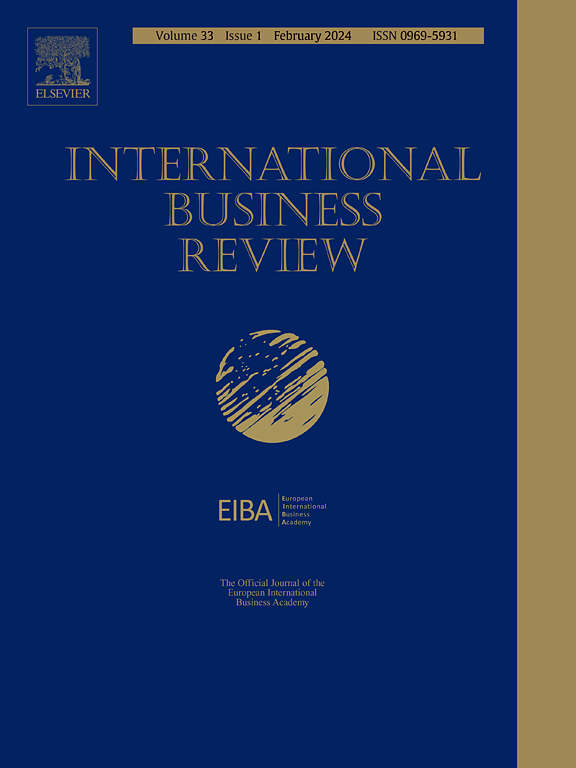International relations and foreign divestment of multinational enterprises
IF 6.1
1区 管理学
Q1 BUSINESS
引用次数: 0
Abstract
Due to the growing complexity of international relations over the past decade, multinational enterprises (MNEs) have embarked on a new era characterized by novel challenges and opportunities. The reversal trend of internationalization has evoked a fast-growing research interest in MNEs’ foreign divestment decisions. However, scant research has integrated the changing international relations in order to examine their propensity to divest. Drawing on insights from the international relations perspective, this study explores the impact of host-country national sentiment (characterized by the prioritization of national interests) and home-host country diplomatic relations (centered on fostering bilateral interests) on foreign divestment. Our findings show that MNEs’ propensity to divest increases when host-country national sentiment becomes stronger but decreases when home-host countries have strengthened diplomatic engagement. These relationships are moderated by MNEs’ ownership strategy. Overall, this study enriches the literature and offers new insights into de-globalization and the research of unilateral and bilateral relations in international business.
跨国企业的国际关系与对外撤资
近十年来,由于国际关系日益复杂,跨国企业进入了一个充满新挑战和新机遇的新时代。国际化的逆转趋势引起了对跨国公司海外撤资决策的快速研究兴趣。然而,很少有研究综合了不断变化的国际关系,以便审查它们的撤资倾向。利用国际关系视角的见解,本研究探讨了东道国民族情绪(以国家利益优先为特征)和东道国外交关系(以促进双边利益为中心)对外国撤资的影响。我们的研究结果表明,当东道国的民族情绪变得更强烈时,跨国公司的撤资倾向会增加,但当东道国加强外交接触时,跨国公司的撤资倾向会减少。这些关系受到跨国公司所有权战略的调节。总的来说,本研究丰富了文献,并为去全球化和国际商务中单边和双边关系的研究提供了新的见解。
本文章由计算机程序翻译,如有差异,请以英文原文为准。
求助全文
约1分钟内获得全文
求助全文
来源期刊

International Business Review
BUSINESS-
CiteScore
14.10
自引率
6.90%
发文量
95
审稿时长
62 days
期刊介绍:
The International Business Review (IBR) stands as a premier international journal within the realm of international business and proudly serves as the official publication of the European International Business Academy (EIBA). This esteemed journal publishes original and insightful papers addressing the theory and practice of international business, encompassing a broad spectrum of topics such as firms' internationalization strategies, cross-border management of operations, and comparative studies of business environments across different countries. In essence, IBR is dedicated to disseminating research that informs the international operations of firms, whether they are SMEs or large MNEs, and guides the actions of policymakers in both home and host countries. The journal warmly welcomes conceptual papers, empirical studies, and review articles, fostering contributions from various disciplines including strategy, finance, management, marketing, economics, HRM, and organizational studies. IBR embraces methodological diversity, with equal openness to papers utilizing quantitative, qualitative, or mixed-method approaches.
 求助内容:
求助内容: 应助结果提醒方式:
应助结果提醒方式:


